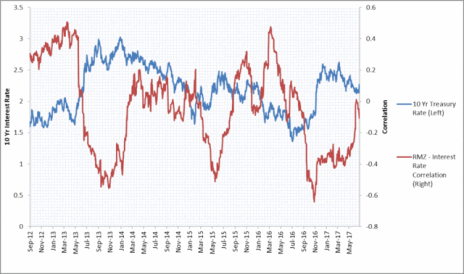As expected, the Federal Reserve hiked the federal funds rate three-quarters of a percentage point on last month - the largest increase in nearly three decades. And it’s clear more rate hikes are coming, as the Fed tries to combat inflation still being at 40-year highs. With rising interest rates here to stay, it’s important to invest with that backdrop in mind.
During periods of rising interest rates, you may consider a realignment in your portfolio, to take advantage of stocks that tend to do well during those periods. That includes utility stocks; financials, which see margin expansion as rates rise; and consumer discretionary stocks, including automobile, retail (not necessarily the brick-and-mortar stores), restaurants and luxury goods.
But one sector that shouldn’t be discounted—but often is due to misinformation—is Real Estate Investment Trusts (REITs). Many investment pros sound the alarm on REITs in rising interest rate conditions, making investors fear not only the loss of generous dividends, but also potential stock collapses. That misconception is far from the truth.
REITs and Rising Interest Rates
Why? It’s based on the assumption that as rates rise, REIT profits will erode, and stock prices will decline. In theory, that looks right, as generally, when rates rise in a fixed income instrument like a bond, prices generally fall. And with mortgage REITs, that’s usually true. They are leveraged to the hilt, so rising interest rates will usually negatively impact their prices. But for equity REITs, that notion doesn’t prove out.
[text_ad]
The following graph was published in Forbes a few years ago, but it’s still relevant to learn from. It plotted monthly data over 10 years between 10-year U.S. Treasury Futures and the MSCI US REIT Index (RMZ) and indicated that while there is some correlation between rate hikes and REIT price declines, the most significant correlation is when rates suffer a sharp hike. In contrast, with gradual rate increases, the correlation declined. That’s because gradually rising interest rates indicate an improving economy, and for REITs, that can mean rising rents and lower vacancy rates, which leads to more profits, and better stock prices.
For the investor, however, when rates begin to rise, REIT investors tend to panic, and that may cause REIT prices to temporarily slide—a buying opportunity, in my opinion.
So, the question is, which REIT categories will likely do just fine as interest rates continue to rise in the months (and likely year) to come?
3 Types of REITs to Buy During Rising Interest Rates
I mentioned mortgage REITs a moment ago, and for the most part, they are not the investments to hold during rate increases. However, the same cannot be said for commercial mortgage REITs. That’s because they tend to borrow at fixed interest rates and lend at variable rates, so their borrowing costs remain fixed, but the lending income rises as rates go up. One caveat, however, is that investors should be aware that rising rates can increase default rates which can lead to dividend cuts. Consequently, it will benefit you to keep a close eye on any commercial mortgage REIT that you own.
Hotel REITs are the most volatile as compared to the S&P 500, which makes sense, as they are also very economically-dependent, but the least volatile when it comes to yield, and that’s because their cash flow is short-term. As long as the economy improves, hotel REITs should also, as consumer discretionary buying rises.
Net Lease REITs show the most volatility to yields, as their long-term contracts—while inflation-adjusted—may not keep up with quick rate rises, but they are the least volatile, compared to the S&P, because they have long-term steady cash flow. But these REITs have been known for dividend safety, good steady income, with decent rates, so gradual rate increases shouldn’t bother them too much.
So, it’s obvious your investing decision in REITs is not just a function of beta. It’s a bit more involved. While rates and economic factors are important, investors must also pay attention to the fundamentals. That means a bit of research, including:
- Funds from operations (FFO): compare four quarters of FFO to the REIT’s annual dividend payments. That is the dividend coverage ratio, which should be more than 1:1, meaning the REIT is earning more than it pays out in dividends.
- Dividend track record—is it stable? Has the dividend been cut?
- Review the portfolio, including the vacancy rate history, credit ratings of its holdings, and diversification.
- Valuation of REITs is every bit as important as with any other stock. It’s best not to overpay; that way, you get the benefit of appreciation plus a handsome and steady cash flow.
If your REIT idea meets most of these criteria, exhibiting fundamental strength and value, then this may be an opportune time to add some steady cash flow to your portfolio.
What types of stocks do you buy when you see rising interest rates? Which ones do you sell? Leave a comment below and share your perspective.
[author_ad]
This post has been updated from an original version, published in 2018.


